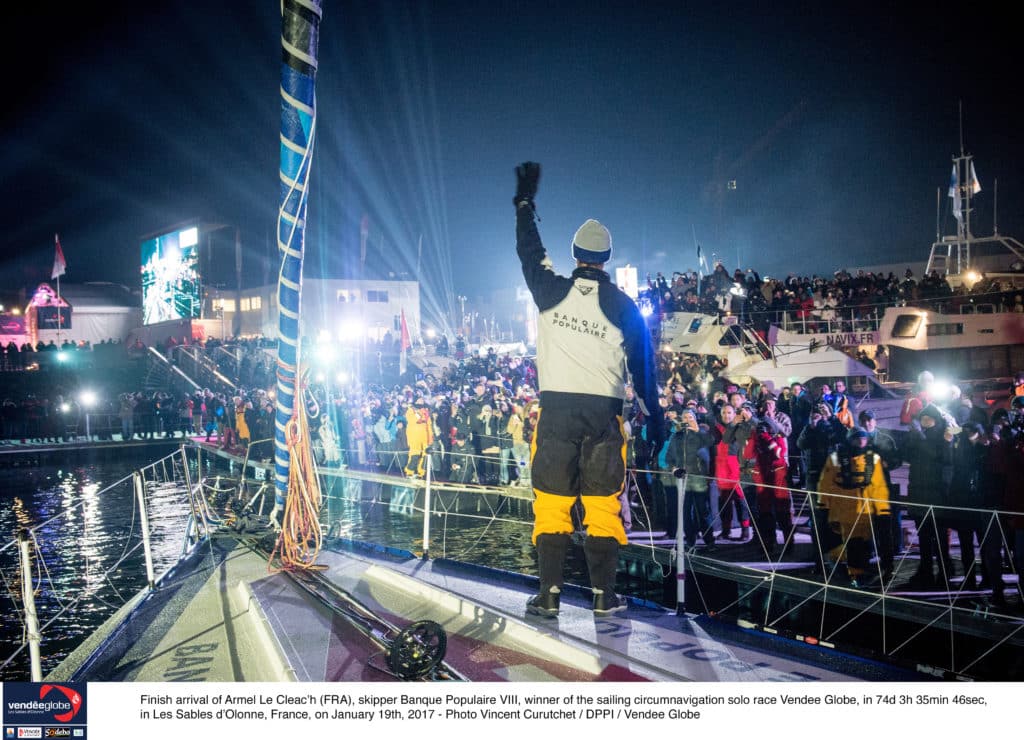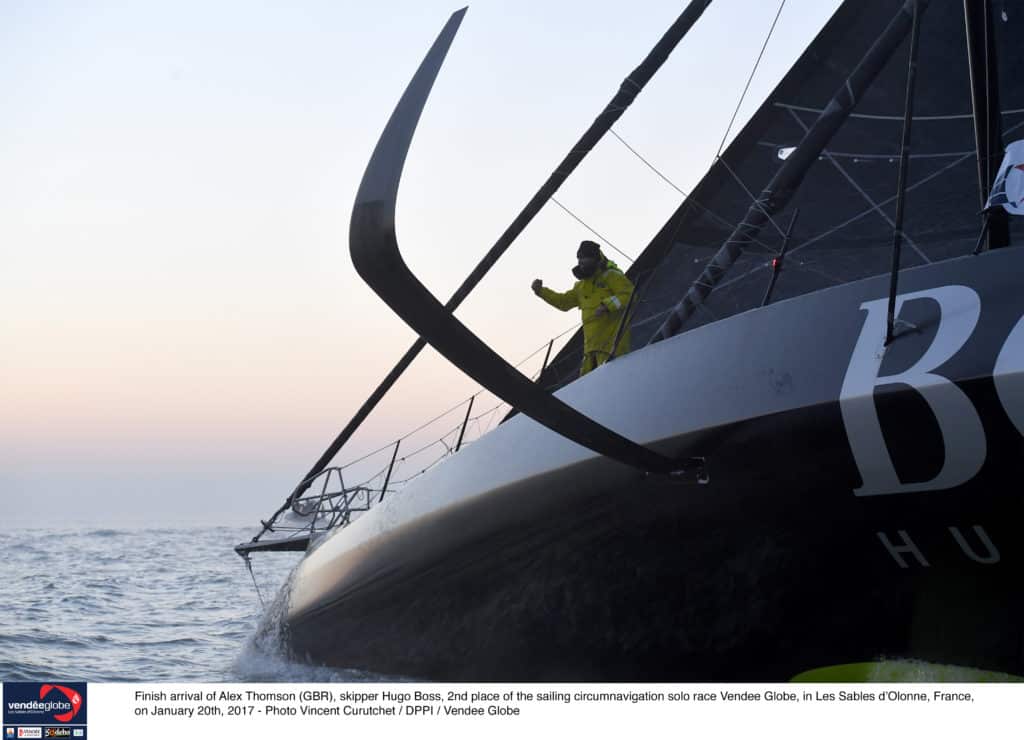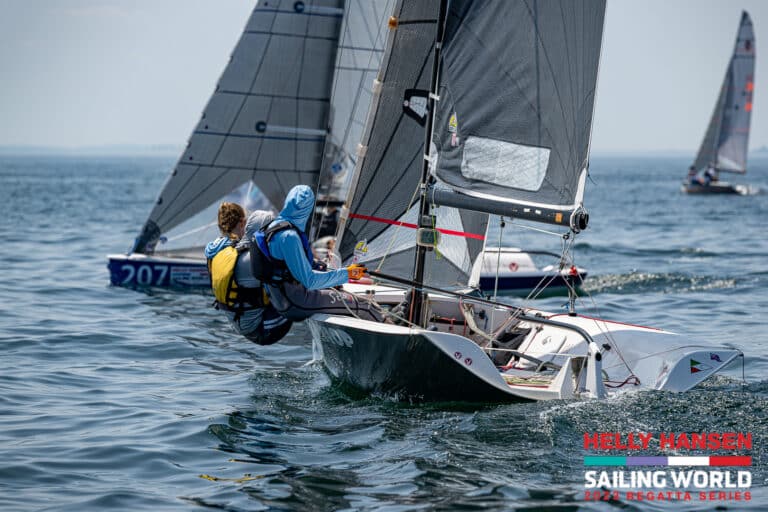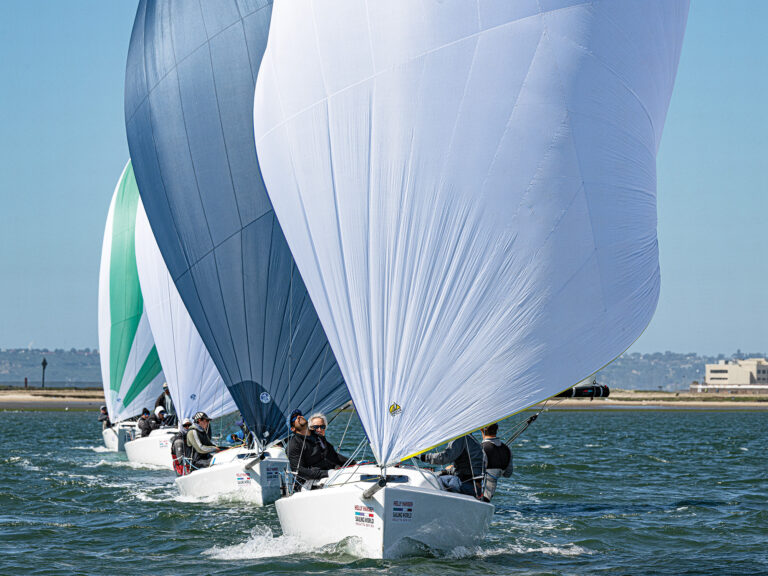
SAILING – VENDEE GLOBE 2017 – BANQUE POPULAIRE VG FINISH
French sailor Armel Le Cléac’h won the Vendée Globe in one of the most thrilling finishes the solo round the world race has ever seen. After 74 days and almost 24,500 nautical miles of first-class ocean racing Le Cléac’h was finally crowned victor in the long-running battle with British skipper Alex Thomson for the top spot in the solo round the world race, regarded as one of the toughest sporting challenges known to man.
Le Cléac’h, 39, from Brittany, sealed the win – and a place in the Vendée Globe history books – crossing the finish line at 1537 UTC yesterday to complete the course in 74 days, three hours and 35 minutes. His time sets a new record for the race, beating the previous record of 78 days 2 hours 16 minutes set by French sailor François Gabart in the 2012-13 edition by three days, 22 hours and 41 minutes.
Dozens of spectator boats took to the water to welcome their new hero back to the French port of Les Sables d’Olonne, from where the race started on November 6 last year. With his shore crew taking control of his 60ft IMOCA race boat Banque Populaire VIII, a tearful Le Cléac’h was left to enjoy an emotional reunion with his son Edgar, 6, and daughter Louise, 9. Thousands more fans lined the walls of the town’s famous harbour entrance as Le Cléac’h arrived dockside at Port Olona to a fanfare of fireworks.
Le Cléac’h, runner-up in the last two editions of the Vendée Globe, said he had now fulfilled a lifelong dream. “This is a dream come true,” he said. “I hoped to win this race 10 years ago but I finished second. Today is a perfect day. I understand that today I have done something big. My team have been amazing they’re the dream team, and this is their day too.” Le Cléac’h also paid tribute to Thomson for his skill and tenacity in pushing him right to the finish line. “It has been very difficult with Alex behind me, he gave me a really hard time in this Vendée Globe,” he added. “Each time things went his way and I got nothing. It was stressful because he kept catching me. With a lead of 800 miles off Cape Horn, I didn’t think I’d be facing such pressure. I’m very happy for Alex, it is a great second place.”
Le Cléac’h took the lead within 24 hours of the race start but had lost it to Thomson by the time the skippers, both racing on new-generation foiling IMOCA 60s, reached the Equator. After catching Thomson in the Southern Ocean the pair traded places on numerous occasions before Le Cléac’h established a solid lead on December 3. From that point on he refused to relinquish his grip on first place despite a sensational effort from Thomson to reduce an 819nm deficit at Cape Horn to just 50 miles at the Equator. Even when Thomson surged to within 30 miles of Le Cléac’h with a few hundred miles to go the French sailor held strong, defending his position until victory was all but guaranteed.
Le Cléac’h averaged an incredible 15.43 knots of boat speed over the 27,455 miles he actually sailed, on occasion hitting speeds in excess of 30 knots. His best 24-hour run came on January 16 when Banque Populaire covered 524.11nm averaging 21.8 knots, surpassed only by Thomson who on the same day sailed 536.81nm averaging 22.4 knots, breaking François Gabart’s existing record by two miles. Le Cléac’h held the top spot for 56 of his 74 days at sea, and between him and Thomson they broke every single one of the existing race records.

SAILING – VENDEE GLOBE 2017 – HUGO BOSS VG FINISH
Thomson, 42, set out to become the first Brit ever to win the Vendée Globe but following an epic battle with French skipper Armel Le Cléac’h missed out on the top spot by just shy of 16 hours. The skipper of Hugo Boss crossed the finish line at 0737 UTC in a time of 74 days, 19 hours, 35 minutes and 15 seconds in one of the closest finishes ever in the race’s 27-year history.
It is the second time in four attempts that Thomson has finished on the Vendée Globe podium – he took third place in the 2012-13 edition after being forced to retire from the 2004-05 and 2008-09 races. The result makes him the most successful non-French skipper in the history of the race. In the 2001 race British yachtswoman Dame Ellen MacArthur finished in second place taking 94 days, four hours and 25 minutes to do so. Sixteen years on Thomson was almost 20 days quicker, a feat made all the more impressive given that one of Hugo Boss’ foils providing lift and therefore speed was destroyed just two weeks into the race.
Thomson arrived in the Vendée Globe’s home port of Les Sables d’Olonne in France at sunrise to rapturous applause from thousands of race fans that braved the freezing temperatures to welcome him home. Among the first to congratulate Thomson on his incredible achievement was his wife Kate, their six-year-old son Oscar and two-year-old daughter Georgia who enjoyed an emotional reunion onboard Hugo Boss prior to arriving at Port Olona marina. “It’s an amazing feeling to be here – you never really know for sure that it’s going to happen until you cross the finish line,” Thomson said. “We’ve been away a long, long time and it’s great to finally be here. I hoped and prayed I could catch Armel but about 24 to 36 hours from the finish I knew that was the end. I’ve spent the whole race wondering what could have happened if the foil hadn’t broken, but it did, and now it’s finished. Congratulations to Armel, what a great race he had and he thoroughly deserved to win. I’m very happy with second place. Now I’m looking forward to getting some sleep, seeing my family and having my life back.”
Thomson and Le Cléac’h were singled out as the pre-race favourites prior to the start on November 6 and they lived up to their top billing, spending much of the 25,000nm race practically neck and neck. Both sailors topped the leaderboard at various stages of the opening days but it was when Thomson rocketed from eighth to first by taking a shortcut through the Cape Verde Islands that the battle between the pair really began. Thomson led at the Equator but on November 19 he hit a submerged object and the starboard foil was ripped from the boat. Despite this he led round the Cape of Good Hope into the Southern Ocean, but was overhauled by Le Cléac’h on December 3. In a display of sheer skill and talent Thomson, with a little help from the weather gods, turned a 800nm deficit at Cape Horn into a gap of just 50nm as the pair crossed the Equator heading north.
He set a new 24-hour distance record on January 16th, sailing 536.81nm at an average speed of 22.4 knots to break Francois Gabart’s existing record by two miles. Hearts were in mouths when Thomson got to within 30 miles of Le Cléac’h with just a few hundred miles to the finish line, but just as it looked like he would cause a major upset his French rival accelerated away to build up an unassailable lead. Thomson sailed 27,636nm in the race at an average speed of 15.39 knots, at times hitting more than 30 knots.









